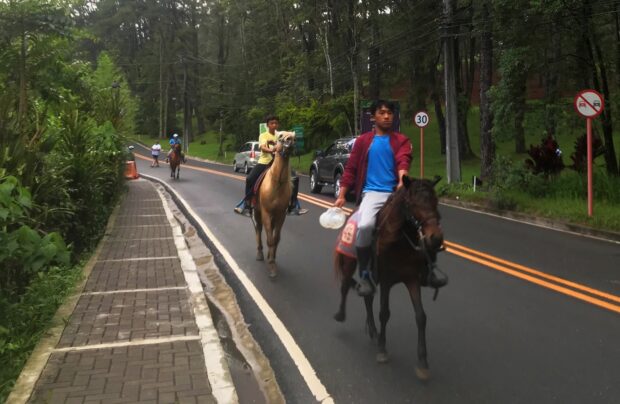Baguio asks Congress to undo John Hay’s segregation from city

REMAINING GREENERY Baguio’s pony boys earn their livelihood renting out horses to tourists at Camp John Hay, where some of the city’s remaining forests thrive. John Hay, which is managed by the Bases Conversion and Development Authority, has been excluded from the city’s townsite reservation under its new charter, a matter questioned by local officials. —VINCENT CABREZA
BAGUIO CITY—The city council here asked Congress to undo a provision in its contentious modern charter that separated the Camp John Hay special economic zone and its forestlands from the Baguio Townsite Reservation.
The resolution was passed by the Baguio City Council during a special session on Friday after the councilors discussed their grievances over Republic Act No. 11689, or the Revised Baguio City Charter, that was authored by Baguio Rep. Marquez Go.
RA 11689, which replaced the 1909 Baguio City Charter, lapsed into law on April 11, 2022, months after nine Baguio councilors urged then President Rodrigo Duterte to veto the new charter.
Many councilors said Camp John Hay’s exclusion from the city townsite granted its administrator, the Bases Conversion and Development Authority (BCDA), more control over 14 barangays located there, as well as state-recognized ancestral lands and Baguio’s only ancestral domain, which are private lands.
But Vice Mayor Faustino Olowan said the immediate action that Congress needed to do would be to render RA 11689 “inoperative” to prevent its “gross errors” from disrupting life in the summer capital.
Article continues after this advertisementOn Aug. 14, the councilor asked the Baguio City Legal Office to study if the city government should take the matter to court by seeking the suspension or annulment of RA 11689.
Article continues after this advertisementWeaponized
Councilors Jose Molintas and Fred Bagbagen, who are both lawyers, have advocated for legal action to stop the new Baguio charter from being enforced, after City Legal Officer Althea Rosario Alberto confirmed to the council that the new charter was one of the defenses being used against Baguio in a tax lawsuit.
The Supreme Court’s Second Division, in its Feb. 22 resolution, ruled that all businesses in Camp John Hay that are not listed with the Philippine Economic Zone Authority must secure business licenses and pay taxes to the city government.
In its June 5 motion for reconsideration, the BCDA asserted that the new Baguio charter recognizes Camp John Hay, the former American rest and recreation baseland, as a “distinct territory” when it asserted that it alone had powers over John Hay businesses.
Molintas said Baguio residents should instead write a third charter that would limit the BCDA’s supervision only on its 240-hectare special economic zone and return the 400-ha forest to Baguio.
Go, who was present during the special session, maintained that nullifying the new charter would be regressive.
He said Section 55 of the law that removed Camp John Hay from the Baguio townsite was a “mere reiteration” of RA 7227, or the BCDA law, and stressed he had no part in the BCDA’s “interpretation” of the new charter in its Supreme Court pleadings.
Water control
But Councilor Arthur Allad-iw cited other provisions in the new charter that gave the BCDA more powers, pointing to Section 53, Article X of the law that stated that waterways “within the lands of [the BCDA] shall remain under the jurisdiction of BCDA,” ignoring how it would affect households inside Camp John Hay.
One of 19 conditions set by the city government on the BCDA in 1995 was for Camp John Hay to source its water outside of Baguio and prevent its businesses from exhausting the city aquifer.
Allad-iw also noted that Section 52 of the new charter inexplicably appoints BCDA estate manager John Hay Management Corp. as a member of a special committee on lands that would resolve Baguio’s numerous property issues including ancestral lands.
Many more provisions in the modern charter, which were lifted from other laws, resulted in errors that would affect Baguio’s government operations if enforced literally, Councilor Peter Fianza informed Go. Fianza, who had compiled anomalous and erroneous provisions in RA 11689 for the council, cited Section 23, Article VIII of the modern charter which directs the city secretary to transmit all Baguio legislation to the Benguet Provincial Board for review, which downgrades Baguio from an autonomous highly urbanized city to a Benguet component city.
Lawyer John Ray Libiran, Go’s legal officer, said it was not in the original draft bill, and may have been “copy-pasted from the local government code (RA 7160)” when it was reviewed by a House committee.
Go filed House Bill No. 7406 which removed some of these errors. The measure was passed by the House of Representatives and has been transmitted to the Senate. Go promised to take up the Council’s proposals before the Senate. INQ
RELATED STORIES
Baguio seeks protection of remaining ‘green spaces’